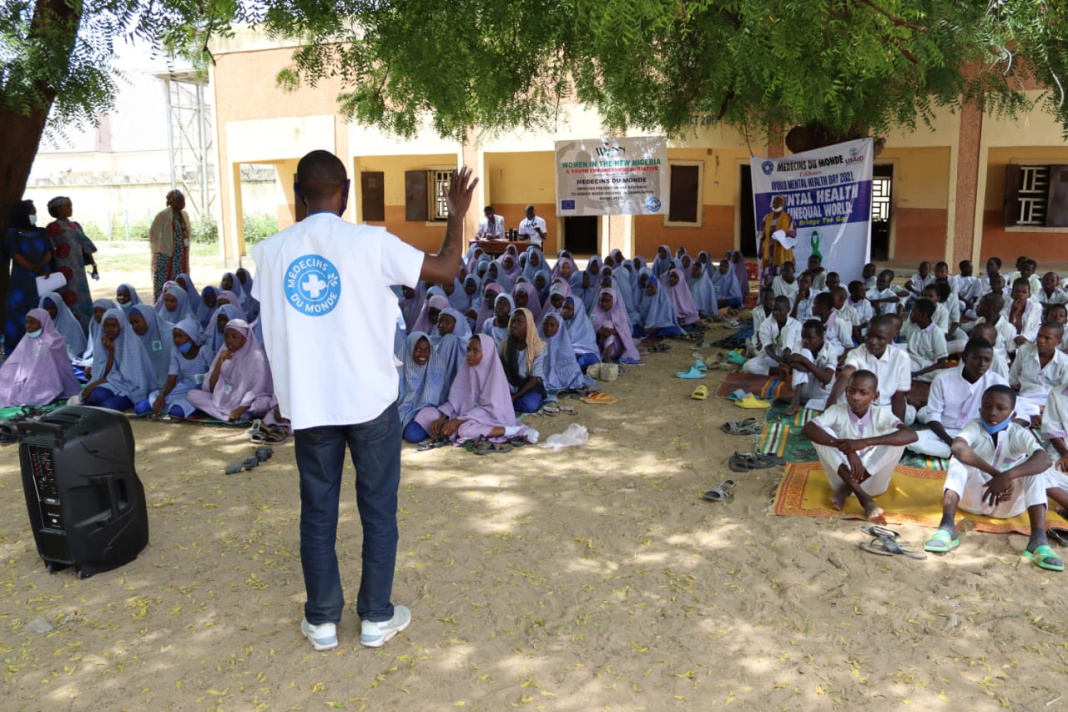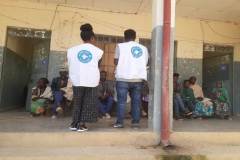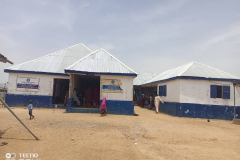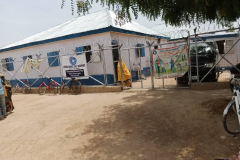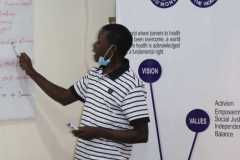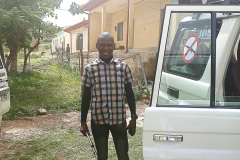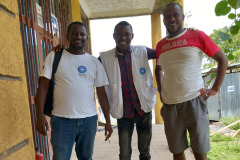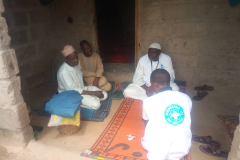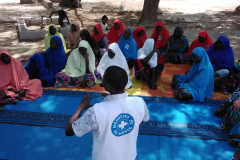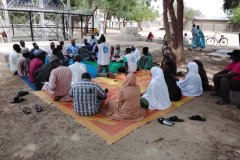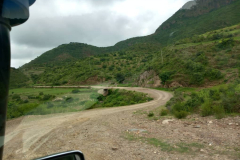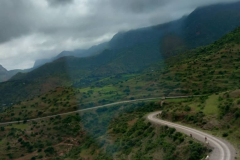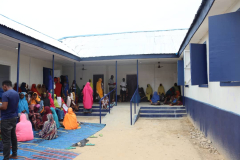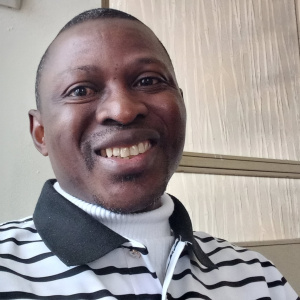
Mental Health and Psychosocial Support
For over 6 years, I have been actively working with Médecins du Monde (MdM). Within this period, I have worked in several capacities, as both field staff ensuring direct implementation and service delivery and at coordination level managing teams. It was so interesting working closely with the beneficiaries who had experienced various levels of psychological distress. Understanding their plights and providing practical support, as well as observing the healing process that brought much joy and satisfaction in their lives, has been fulfilling.
Ending up in the humanitarian setting, and especially in MdM, was one of the greatest decisions for me. It will interest you to know that I have a background in psychology with specialty in clinical psychology. I was in active practice in a hospital setting, as a clinical psychologist, before I joint this committed organization. My experience at the facility, working with people with mental, neurological and substance use (MNS) conditions, pushed me to look towards the humanitarian setting. I watched many individuals and families struggled to access care for their loved ones. Those who had little resources afforded brief care and were discharge without completing the treatment, while many who could not afford, watched their loved ones pass through distress without any form of support. The increased conflicts and insecurity in different parts of Nigeria, at that time, precipitated the increase in mental health problems.
On top of that, the myriad of socio-economic and political factors such as poverty, limited access to social capital, parenting, political instability, inter alia, impacted daily living in Nigeria and have exposed many people, particularly, young people to many forms of psychosocial vulnerabilities and distress. The situation has not been any better today. Despite the aforementioned, access to basic health services including mental health remains very limited, and where such exists, those who benefit from it are stigmatized against. I became so concerned about the most vulnerable and those who could not afford treatment, considering the inadequate human resource, cost of treatment, cultural beliefs and social factors such as stigma linked to mental illness. I needed to support and to be a part of a team that can reach out to those who had little or no access to support. That was the beginning! The spirit of becoming a humanitarian worker started developing in me. I applied for a position in MdM in 2016 and took my time to read about the organization. I was happy about their intervention and approach, and I thought “I will have the opportunity to continue with my practice, and support the most vulnerable persons who may not afford to help themselves.” Albeit, the recruitment process did not continue several months later the same positions were readvertised and I applied again, passed through the recruitment process and was hired. I became one of the pioneer staff of the MdM- France mental health and psychosocial support (MHPSS) department, Nigerian mission.
My daily activities in a «normal day»
All of MdM’s MHPSS services are based on the IASC guidelines on MHPSS in emergency settings. Thus, it has been really fascinating how I have been able to ensure the implementation of MHPSS strategy in our daily work. MHPSS services are integrated in all MdM’s activities in both mobile clinics and government supported facilities. I have a team of psychologists and/or counsellors, who work as part of healthcare team, providing a range of MHPSS services including case management in the form of individual and group counselling, psychoeducation, community awareness raising and sensitizations on MHPSS, among others. These services are aimed at alleviating the suffering of individuals who are experiencing different levels of psychological distress. More specifically, our daily activities include group psychoeducation at the OPD, on different mental health and psychosocial topics. The psychoeducation sessions offered us with an opportunity to provide information to the patients and empower them with basic skills on their psychological distress they know little or nothing about and also to seek further support.
The team provides individual and group counselling sessions. On group activities, we have coordinated with other departments like nutrition and gender-based violence (GBV). We have also support groups for caregivers and their children, who are experiencing some problems with nutrition, considering that poor nutrition is very much linked to mental and psychosocial deficits especially in children. In addition, we have caregiver-child support groups where we provide support to mothers as well as improve on the level of child psychosocial stimulation. In Nigeria, through our local partner, Zenith of the Girl Child and Women Initiative Support (ZEGCAWIS), we established a safe space for women and adolescent girls. Because of the sensitivity of GBV cases, and because the health facilities may not guarantee adequate privacy and confidentiality for the survivors, the safe space was used to provide support group sessions to the survivors. Important among the activities at the safe space was the psychosocial life skills training for the beneficiaries. As part of our daily activities, group counselling is provided to those with similar severe MNS problems.
The beneficiaries have the opportunity to share their experiences and learn from one another, different coping mechanisms that promote their healing process. Family counselling sessions are also organized, especially for beneficiaries with severe MNS conditions, to ensure the involvement of their respective caregivers in the management process and a strong social support system is put in place to enhance the healing process of the beneficiaries. MdM’s MHPSS intervention at the 4th layer of the MHPSS pyramid, focuses on specialized psychological support. To ensure that the beneficiaries get the biopsychosocial support, I established referral pathways with the World Health Organization (WHO), Ministry of Health (MoH), for the provision of psychotropic medications. For instance, in Nigeria, we have a good collaboration with WHO, which has resulted to the creation of outreach services across all MdM’s facilities for the provision of psychotropic medications by WHO psychiatric nurse. In Ethiopia, we make referrals to identified designated government health facilities, been supported by the regional health bureau, WHO, Unite Nations Children’s Fund (UNICEF) etc.
For proper integration of MHPSS, and to ensure adequate support is provided to the field team, I conduct regular field visits to identify gaps and provide on the job mentoring. I assess training needs of the healthcare staff, plan and deliver relevant capacity building with regular supervision. I have a case conferencing session with the MHPSS team weekly to discuss difficult cases, share ideas on case specific approaches, follow up on the team’s psychosocial support needs. To ensure that the MHPSS team is also supported (care for the caregivers), the clinical supervision activity was introduced in Nigeria and provided by and external facilitator on quarterly bases. This activity brings the team together from different locations to share their experiences, process their difficult emotions, either in a group or individual session, with the external facilitator.
The MHPSS activities also extend to the communities. The MHPSS team with support from the community mobilizers, conducts MHPSS focused community leaders’ meetings, for both males and females, quarterly (in Nigeria) where participants are educated on MHPSS, feedback and challenges are received and addressed. This activity however, has supported a lot of referrals made to MdM supported facilities by the community leaders. As part of our routine community-based activities, the MHPSS team conducts home visits, as part of a psychosocial inclusion process, especially to beneficiaries with MNS conditions, with focus on improving their communication skills and family support, psychoeducation on psychosocial issues including substance use, gender-based violence, adherence to medications, and follow up. We commemorate the international event days such as World Mental Health Day (WMHD) in a more cultural way that promote healing. For instance, in Nigeria, community theater where songs, dance, music, drama have been used over the years.
I participate in several weekly internal program and coordination meetings with the purpose of monitoring and following up on activities. I represent the organization in both the national and regional technical working group meetings with other partners with the aim of strengthening our synergy for quality support to the beneficiaries.
The most interesting part of my job…
There are quite a number of things I like about what I do. Right from providing practical support to beneficiaries at the field level, to developing technical materials, and building the capacity of others to support or take over the responsibilities when I am not there. I have, even as a coordinator, in several occasions, been assigned beneficiaries at the facility to provide support, especially those with complicated psychological conditions. It gladdens my heart, and gives me that satisfaction whenever these distressed beneficiaries and their families return to me with smiles on their faces. Most importantly, my job makes me genuine, of course, you have to be what you are otherwise you will be easily spotted out, if you pretend; this will have a lot of negative impact on your identity as well as the work.
Most of the time, I find it difficult to spot one single interesting thing about what I do. This is because it is a field that deals with human behavior, and of course, human behavior is complex and evolves daily. As a technical person, I spent a lot of time studying and researching new trends of behaviors in order to come up with new ideas, new tools that will support the team in providing proper assessment and intervention approach to help the beneficiaries. It may also interest you to know that MHPSS is remarkably interesting when it is experienced in different cultures. It gives me satisfaction to understand the cultural differences on how people express distress, the different conceptualizations about mental illness and psychosocial problems, cultural variations in coping with distress and building resilience; I enjoy working and developing culturally appropriate tools to respond to the needs of the people.
I enjoy moments where I build capacity of individuals in MHPSS. Throughout my journey in this field, I have been involved in training, mentoring and supervising students from higher institutions, healthcare and humanitarian workers. It gives me great satisfaction to see those whom I have trained and mentored doing greatly both in the healthcare settings and humanitarian environment. For me, it is not all about the physical reward but the satisfaction I derive seeing the most vulnerable and the less privileged, the neglected, with mental health and psychosocial problems, smile again. It is evidenced that mental health and psychosocial support is not adequately prioritized, especially in Africa. Thus, we have to move, as humanitarians in the helping profession, against personal gratification, to provide support.


